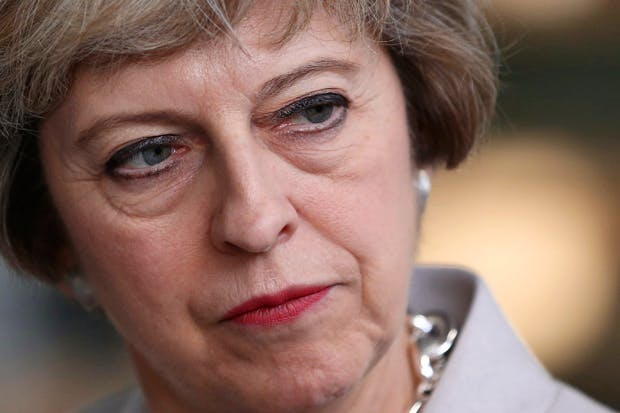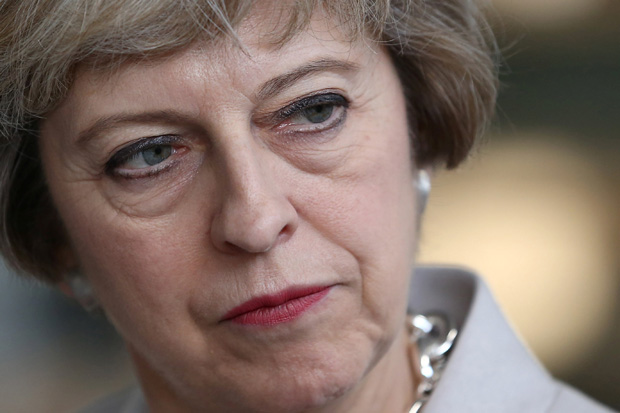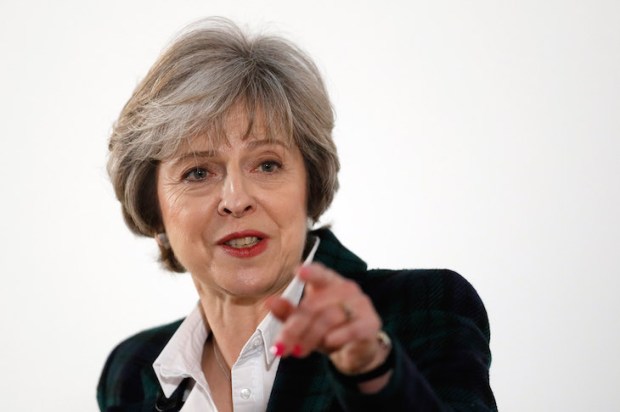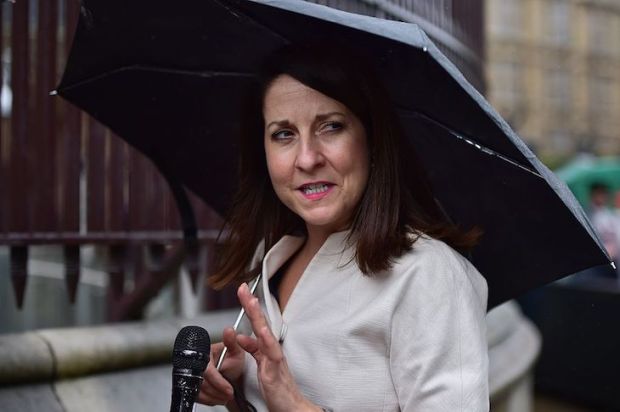Standing outside No. 10, our newly chosen — though not elected — Prime Minister decided to address the country directly. It was finally time, we learned, for a government dedicated to those who had been left out. ‘To those who feel the political system doesn’t listen and doesn’t care; to those who feel powerless and have lost faith; to those who feel Westminster is a distant place and politics simply a spectator sport: I will strive to earn your trust.’ These words — and other lines about parents juggling work and childcare — were perfect for Theresa May’s pitch of one nation Toryism.
But they had been uttered before: by Gordon Brown in 2007, as he accepted his Labour leadership nomination. May’s version of the same speech differed only in syntax: ‘You can just about manage, but you worry about the cost of living and getting your kids into a good school,’ she said, describing the people she wanted to address ‘directly’. She even borrowed Brown’s verbal trademark: pledging to run a government ‘driven not by the interests of the privileged few’ but by those of the many.
The two prime ministers bear other similarities to each other. Both struggle to delegate; both trust very few ministers. Both appointed chancellors who would obey them, men who could be relied upon not to make the Treasury a rival power base. Both encouraged the press to regard their arrival in No. 10 as the time when spin was supplanted by substance. ‘Not flash, just Gordon,’ said Mr Brown. ‘I just get on with the job,’ says Mrs May. And what was the job? Neither of them really said. Instead, both started their premierships by defining themselves against their predecessor.
Brown announced curbs on government power, promising MPs a vote over going to war or signing an international treaty. It was his way of saying ‘I’m not like that bombs-away Blair chap.’ Theresa May’s first announcement was that she would chair cabinet committees on the economy and industrial strategy, on Brexit, international trade and social reform. It was the kind of dull announcement that excites only Whitehall nerds — but its boring earnestness was the point. It signalled that May was diametrically different from her chillaxing predecessor and his PR gimmicks. To drive the point home, she told her new cabinet that ‘politics is not a game’. No prizes for guessing who, in her mind, had thought differently.
But the risk is that Mrs May ends up deploying the same gimmicks and empty policies that Mr Brown did. He scrapped the controversial Blairite super-casinos, introduced an NHS constitution and proposed a British bill of rights. These policies were based not on solid research as to whether or not they would work, or make a material difference to people’s lives, but a desire to say ‘I’m not Blair’.
May’s most significant departure from Cameron’s reign so far has been her suggestion that she’d scrap the ban on new grammar schools. In opposition, Cameron and his colleagues argued that these selective schools didn’t improve social mobility, and that continuing to yearn for their return would mean the party was merely a ‘right-wing debating society’. Enough Tories did continue to yearn for their return — around 100 of them regularly put their name to letters calling for existing grammars to expand — to make it worth May’s while to unpick this aspect of Cameron’s modernisation project.
But why the change? Has she come across any research showing that grammars do not create winners and losers in the way that Cameron feared? Or is she backing grammars because Cameron didn’t like them? If she wants to legislate, she may find that her style is too sectarian for the liking of those Tory MPs who did not regard the last six years as the long dark reign of the toffs. ‘We won’t let her do this to our party,’ hisses one angry Cameroon from the back benches. Mrs May cleared a great many ministers out of government, and they’re sore enough to make her slim majority even slimmer.
The prime ministers have even managed to make the same announcement nine years apart: curbs on the much-maligned special advisers. Brown wanted to stop them giving orders to civil servants, to signal his distaste at the days of all-powerful advisers such as Alastair Campbell and Jonathan Powell. (He had, in Damian McBride, his own evolution of the species.) May is trying to limit the numbers of advisers and is muscling in on individual appointments. In theory, any cabinet member ought to be able to hire whoever he or she likes. In practice, the Prime Minister wants to be sure that no one manages to build the power base she assembled in the Home Office. Her aides then — Nick Timothy and Fiona Hill — now serve as her joint chiefs of staff in No. 10.
As she knows, good advisers can defend their turf rather effectively — hers were responsible for high-profile spats with rivals such as Michael Gove. She is limiting each cabinet member to two advisers, which — as she knows — often isn’t enough: also joining her in Downing Street is her third former adviser at the Home Office, Stephen Parkinson. But even Brown ended up hiring just as many advisers as Blair — at one stage he was recruiting one a fortnight. As he found out, hiring effective people is a symptom of basic managerial competence rather than megalomania.
We know that May wants to speak on behalf of the people who struggle, but then so did Brown — and those people didn’t thank him for those good intentions when it came to an election. A prime minister is judged on his or her own record, not their distance from somebody else’s. It’s understandable that, having come to office without a leadership election, Mrs May is trying to reintroduce herself to Britain as the anti-Cameron, who somewhat foolishly called himself the heir to Blair. She should beware of becoming the heir to Brown.
Isabel Hardman is assistant editor of The Spectator. Her Radio 4 documentary, Party Futures, was broadcast this week: hear it at www.spectator.co.uk/partyfutures
Got something to add? Join the discussion and comment below.
Get 10 issues for just $10
Subscribe to The Spectator Australia today for the next 10 magazine issues, plus full online access, for just $10.















Comments
Don't miss out
Join the conversation with other Spectator Australia readers. Subscribe to leave a comment.
SUBSCRIBEAlready a subscriber? Log in